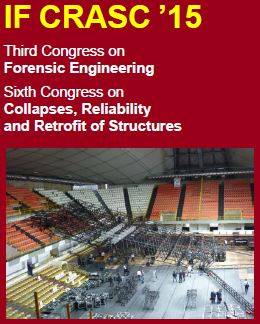Congresso IF CRASC ’15
Si terrà all'UNIVERSITA DI ROMA "LA SAPIENZA" il prossimo IF CRASC ’15 dal 14-16/05/15
Third Congress on Forensic Engineering
Sixth Congress on Collapses, Reliability and Retrofit of Structures
School of Civil and Industrial Engineering
Sapienza University of Rome
Aula del Chiostro - Via Eudossiana 18
14–16 May 2015
First Announcement
ORIGIN OF THE IF CRASC CONGRESS
The IF CRASC congress series originated from the institution of a second level Master programme (post-graduate programme) on Forensic Engineering at the University of Naples Federico II, Italy. Such a Master programme was the first one in Europe and includes subjects of both Civil and Industrial Forensic Engineering.
Beside the traditional sector of Structural Forensic Engineering (mainly focused on failures and collapses), in the last years, academics, professionals and public institutions have shown a growing interest not only in legal issues of engineering practice (e.g., procedures and responsibilities), but also in forensic fields of Industrial Engineering and Information Technology. This led to an extension of the topics covered by past Congresses on Collapses, Reliability and Retrofit of Structures to additional sectors of Forensic Engineering.
The outstanding success of the past IF CRASC Congresses, as well as of other initiatives promoted in Italy and abroad on similar subjects since 2009, has allowed the Italian Association of Forensic Engineering (AIF) to organise the IF CRASC '15 Congress in Rome.
 OBJECTIVES OF IF CRASC’15
OBJECTIVES OF IF CRASC’15
The main aim of the 2015 edition of IF CRASC Congress is to promote the exchange of knowledge and experience among academics, professionals, public administration managers, private company employees, jurists, and judges in the civil, industrial and information technology fields of Forensic Engineering.
Special interest will be given to:
- Situations affected by human activities, also in terms of fault and malicious actions in design, construction, management and control of civil facilities, industrial processes, and both computer and electronic networks.
- Extreme actions (e.g., fires, explosions, impacts) and their complex effects (e.g., progressive collapse phenomena, cascade disasters, catastrophic events).
- Holistic design criteria for systems, structures and infrastructures: resilience, dependability, robustness, sustainability.
The Congress sessions will also cover emerging issues highlighted in the last years in Italy and abroad.
The Congress will include general keynotes, invited lectures, oral presentations and a round-table session focused on major legal, technical and scientific issues in Forensic Engineering. Different teams of experts will help to produce guidelines on specific topics
MAIN TOPICS OF IF CRASC ’15
Legal issues in Engineering:
- Mediation Procedures
- Investigation Procedures
Civil Forensic Engineering:
- Environmental Pollution and Sanitary Engineering
- Noise Pollution and Vibrations
- Unauthorised Construction and Land Development
- Buildings and Infrastructure Issues
- Geotechnical Issues (Slope Stability, Tunnels, Foundations, etc.)
- Economic loss assessment
- Contract and Construction Management
- Structural and Land Monitoring
- Survey and Computer-Aided Drawing Techniques
Industrial Forensic Engineering:
- Chemical Accidents
- Plant and Electrical Network Issues
- Aeronautical Accidents
- Railway Accidents
- Naval Accidents
- Road Accidents
- Risk areas, Major Accidents and Disasters
Information Technology Forensic Engineering:
- Computer Security
- Telecommunication Network Issues
- Electronic System Issues
Structural Forensic Engineering:
- Structural Failures and Collapses
- Urgent Remedial Measures
- Serviceability Loss of Large Facilities and Infrastructures (Dams, Tunnels, Bridges, Harbour Facilities, Industrial Sites, etc.)
- Extreme Load Modelling (Fires, Explosions, Impacts, etc.) and Structural Response Analysis (Progressive Collapse, etc.)
Structural Reliability:
- Risk Analysis and Identification of Contingent Scenarios
- Probabilistic and Heuristic Methods
- Time-Dependent Behaviour of Structures (Life Cycle, Material Degradation, Fatigue, etc.)
- Multi-Hazard Situations and Chain Events, Structural Robustness, Dependability
Structural Retrofitting:
- Modelling and Analysis of Retrofitted Structures
- Protection of Cultural and Archaeological Heritage
- Sustainability of Retrofit Interventions
- Innovative Techniques
PER MAGGIORI INFO SCARICA LA LOCANDINA
